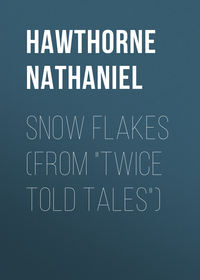Kitobni fayl sifatida yuklab bo'lmaydi, lekin bizning ilovamizda yoki veb-saytda onlayn o'qilishi mumkin.
Kitobni o'qish: «Snow Flakes (From "Twice Told Tales")»
SNOW-FLAKES
There is snow in yonder cold gray sky of the morning! – and, through the partially frosted window-panes, I love to watch the gradual beginning of the storm. A few feathery flakes are scattered widely through the air, and hover downward with uncertain flight, now almost alighting on the earth, now whirled again aloft into remote regions of the atmosphere. These are not the big flakes, heavy with moisture, which melt as they touch the ground, and are portentous of a soaking rain. It is to be, in good earnest, a wintry storm. The two or three people, visible on the side-walks, have an aspect of endurance, a blue-nosed, frosty fortitude, which is evidently assumed in anticipation of a comfortless and blustering day. By nightfall, or at least before the sun sheds another glimmering smile upon us, the street and our little garden will be heaped with mountain snow-drifts. The soil, already frozen for weeks past, is prepared to sustain whatever burden may be laid upon it; and, to a northern eye, the landscape will lose its melancholy bleakness and acquire a beauty of its own, when Mother Earth, like her children, shall have put on the fleecy garb of her winter's wear. The cloud-spirits are slowly weaving her white mantle. As yet, indeed, there is barely a rime like hoarfrost over the brown surface of the street; the withered green of the grass-plat is still discernible; and the slated roofs of the houses do but begin to look gray, instead of black. All the snow that has yet fallen within the circumference of my view, were it heaped up together, would hardly equal the hillock of a grave. Thus gradually, by silent and stealthy influences, are great changes wrought. These little snow-particles, which the storm-spirit flings by handfuls through the air, will bury the great earth under their accumulated mass, nor permit her to behold her sister sky again for dreary months. We, likewise, shall lose sight of our mother's familiar visage, and must content ourselves with looking heavenward the oftener.
